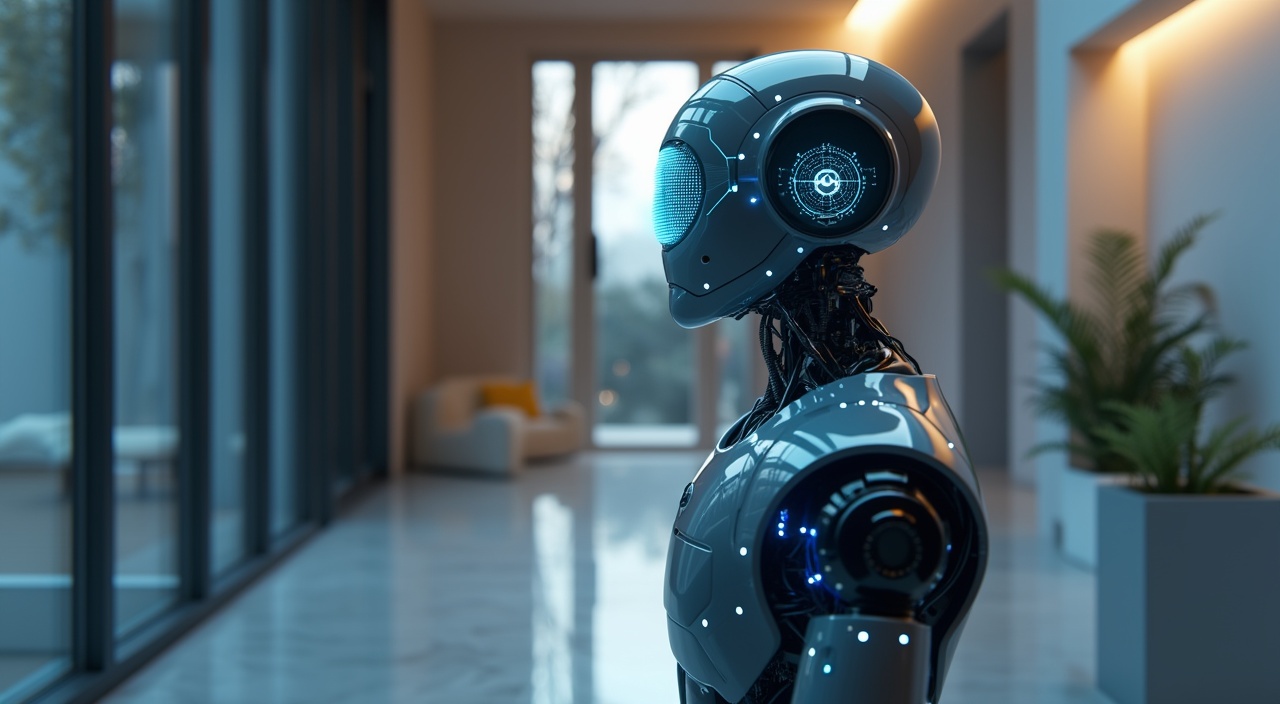I’ve found that artificial intelligence is quietly revolutionizing our homes, transforming mundane daily tasks into seamless, intelligent experiences. Smart home technology has evolved from a novelty to a necessity, with digital assistants now anticipating our needs before we even recognize them.
Key Takeaways:
- AI-powered devices like smart thermostats, refrigerators, and security systems are learning and adapting to individual household behaviors
- Smart home technology now covers everything from entertainment recommendations to kitchen assistance and home security
- By 2025, nearly half a billion households will have AI assistance managing daily tasks
- Digital assistants are developing more natural interactions, blurring the line between technology and personal experience
- Privacy and decision-making boundaries remain critical considerations in the AI home integration process
I’ve watched AI transform my own home from a collection of disconnected gadgets into an integrated ecosystem that actually makes life easier. The change happened so gradually that I barely noticed until one day, my home seemed to understand exactly what I needed.
Smart devices have become much more than fancy toys. They’re now practical tools that learn your patterns and preferences. My thermostat adjusts temperatures based on my family’s schedule, saving energy without anyone lifting a finger. Strange but true: these systems often know our habits better than we do.
AI has expanded far beyond basic functions. Entertainment systems now suggest movies based on your mood, while kitchen appliances help plan meals around what’s in your refrigerator. Security systems can distinguish between normal activity and potential threats, sending alerts only when something truly requires attention.
The numbers tell a compelling story. Industry research indicates that by 2025, approximately 500 million households worldwide will rely on AI assistants for daily tasks. Let that sink in. This isn’t some distant future technology—it’s happening right now in homes across the globe.
The good news? Digital assistants have become significantly more conversational. Gone are the days of awkward commands and stilted responses. Today’s AI interactions feel natural, almost human-like, making the technology accessible to everyone from tech enthusiasts to grandparents.
But wait – there’s a catch: this convenience comes with important considerations. As AI becomes more integrated into our daily lives, we must establish clear boundaries around privacy and decision-making. I’ve learned to carefully review privacy settings and understand exactly what information my devices collect and how they use it.
AI virtual assistants aren’t just changing how we control our homes—they’re reshaping family dynamics. Parents can monitor children’s safety remotely, while elderly family members gain independence through voice-controlled assistance. These technologies bridge generations, creating new ways for families to connect and care for each other.
Here’s what I mean: My father, initially resistant to smart home technology, now relies on voice commands to control lighting, temperature, and entertainment. This simple interface has eliminated his frustration with complicated remotes and switches, giving him back a sense of control.
The integration of AI in everyday household tasks creates a ripple effect throughout your daily routine. Morning alarms sync with coffee makers, lighting adjusts to your circadian rhythm, and security systems arm themselves when you leave—all without conscious effort. This automation frees mental bandwidth for more meaningful activities.
Picture this: You arrive home after a long day, and your house has already adjusted the temperature, turned on appropriate lighting, and perhaps even started dinner preparation based on your typical schedule. This isn’t science fiction—it’s what AI-enabled homes can do today.
I’ve found that AI technology works best when it complements rather than replaces human decision-making. The most effective smart home setups maintain a balance—handling routine tasks automatically while leaving important choices to humans. This partnership between AI and human judgment creates the optimal living environment.
For anyone considering diving into the world of AI-powered homes, I recommend starting small with one or two devices that address specific needs. This approach allows you to become comfortable with the technology before expanding. My journey began with a simple smart speaker and gradually grew into an integrated system as I discovered new possibilities.
The future of AI in our homes looks incredibly promising. As language processing capabilities continue to advance, our interactions with these systems will become even more intuitive. Soon, digital assistants may anticipate needs we haven’t yet recognized ourselves, truly earning their place as essential household members.
To fully benefit from these technologies while protecting your privacy, I suggest these practical steps:
- Regularly review privacy settings on all connected devices
- Understand what data is being collected and how it’s used
- Create clear boundaries about which decisions AI can make autonomously
- Keep software updated to maintain security protections
- Maintain manual overrides for all automated systems
The integration of AI into our homes represents one of the most personal applications of this revolutionary technology. By thoughtfully incorporating these systems into our daily lives, we can enhance convenience without sacrificing privacy or autonomy—creating homes that truly work for us, not the other way around.
Smart Home: Your Automated Personal Assistant
I’ve seen first-hand how smart home technology has transformed from novelty to necessity. With 63% of US households now owning at least one smart device, these digital butlers have quietly slipped into our homes and revolutionized our daily routines.
Beyond Basic Automation
My home now anticipates my needs before I even realize them. The Nest Learning Thermostat tracks my comings and goings, automatically adjusting temperatures to slash my energy bills while keeping things cozy. Ring doorbell cameras don’t just show who’s at the door—they recognize familiar faces and alert me to unexpected motion, giving me peace of mind whether I’m upstairs or across town.
The magic happens when these systems start learning your habits. My Philips Hue lights now fade on gently before my alarm, brighten during work hours, and shift to warmer tones in the evening—all based on patterns they’ve picked up from my behavior. It’s like having a butler who knows exactly what you want before you ask.
AI in the Kitchen: Your Digital Sous Chef
Gone are the days of opening the fridge door and staring blankly at its contents. AI has slipped into our kitchens like a silent helper, transforming how we cook, shop, and eat.
Smart Refrigerators That Think For You
My Samsung Family Hub refrigerator now does more than just keep food cold – it’s practically a meal planner with a cooling system. Using cameras and image recognition technology, it tracks what’s inside, tells me when food is about to expire, and suggests recipes based on what I have.
“Hey, I see you’ve got chicken, broccoli, and garlic – how about a stir fry tonight?” It hasn’t quite mastered the art of sarcasm when I ignore its suggestions, but it’s learning.
AI-Powered Cooking Companions
The kitchen AI revolution extends beyond refrigerators. Here’s how your digital sous chefs are shaping up:
- The Whirlpool Yummly app watches what foods you like and dislike, then recommends recipes tailored to your taste preferences – though it hasn’t figured out that my midnight snack choices shouldn’t count toward my “favorites”
- June Oven uses computer vision to recognize what you’ve placed inside and automatically adjusts temperature and cooking time, saving countless foods from my tendency to overcook everything
- Recipe apps like SmartChef analyze your pantry contents and dietary restrictions to suggest meals that won’t send you back to the grocery store
My favorite part? These AI cooking assistants adapt to your habits over time. They learn that I like my toast nearly burned and my pasta always al dente – something even my human guests haven’t figured out yet.
Entertainment Redefined: AI-Powered Personal Entertainment
I’ve watched my entertainment habits transform dramatically with AI’s subtle influence. Those “Because you watched…” suggestions on Netflix aren’t random—they’re powered by sophisticated algorithms that drive a whopping 80% of all Netflix viewing time.
Smart Entertainment at Your Command
Your favorite streaming platforms have become digital mind-readers, studying your habits to serve exactly what you might enjoy next. Here’s how AI has sneakily become your entertainment curator:
- Personalized recommendations: Netflix analyzes thousands of viewing patterns to suggest your next binge-worthy show, creating a unique experience for each user
- Custom playlists: Spotify’s Discover Weekly uses AI to craft personalized music collections that sometimes know your taste better than you do
- Voice-controlled fun: Amazon Echo lets you command your entertainment kingdom with simple phrases like “Play something funny” or “Find action movies with Tom Cruise”
- Interactive experiences: Smart speakers can engage family members with AI-powered games, trivia, and storytelling sessions
The real magic happens behind the scenes. These systems continually learn from your interactions, getting smarter with each choice you make. I’ve found my own viewing habits becoming more satisfying as these systems learn my preferences.
The line between technology and personal taste has blurred. Your digital entertainment butler knows when you’re in the mood for comedy on Friday nights or documentaries on Sunday mornings. It’s like having a friend who always knows what you want to watch—except this friend remembers absolutely everything you’ve ever liked.
Home Security Reimagined: AI Protecting What Matters Most
Smart Security That Thinks For You
I’ve noticed a significant shift in why people invest in smart home tech. Data shows 60% of smart home device owners point to security as their main reason for making the purchase. This makes perfect sense—your home isn’t just a collection of walls and furniture; it’s where your life happens.
Today’s AI-powered security systems do far more than just beep when a door opens. They’re actually thinking about what’s happening in your home:
- The Nest Protect doesn’t just detect smoke—it tells you exactly what type of smoke it’s sensing and where it’s coming from
- Vivint Smart Home systems can distinguish between your teenager coming home late and an actual intruder
- Canary devices monitor air quality and environmental conditions alongside security, giving you a holistic picture of your home’s health
These systems learn your routines and alert you to genuine anomalies rather than false alarms. It’s like having a security guard who never needs coffee breaks and gets smarter every day. Remember when home security meant a barking dog and deadbolts? Those days are long gone.
AI Invades Home: 10 Easy Steps to Fortify Your Family’s Privacy Fortress!

The Future Arrives: AI’s Home Transformation
Smart homes aren’t just for tech enthusiasts anymore. By 2025, nearly half a billion households will have AI assistance managing daily tasks. These digital butlers are getting smarter by the minute, handling everything from temperature control to security monitoring.
Tomorrow’s Connected Home
AI homes are rapidly evolving beyond simple voice commands. Your digital butler is learning to predict needs before you even realize them. Smart devices now talk to each other in ways that create truly personalized experiences – turning up the heat when you’re heading home on a cold day or suggesting dinner recipes based on what’s in your fridge.
The Human Touch in Digital Form
The coldness of technology is fading as AI assistants develop more natural conversations and responses. These advances raise important questions about privacy protection and how much decision-making power we should hand over to our digital companions. Finding this balance will shape how we live alongside AI in our most private spaces.
Sources:
– Online Degrees, University of San Diego
– MobiDev
– The Data Scientist
– Insider Monkey
– Voxia AI








